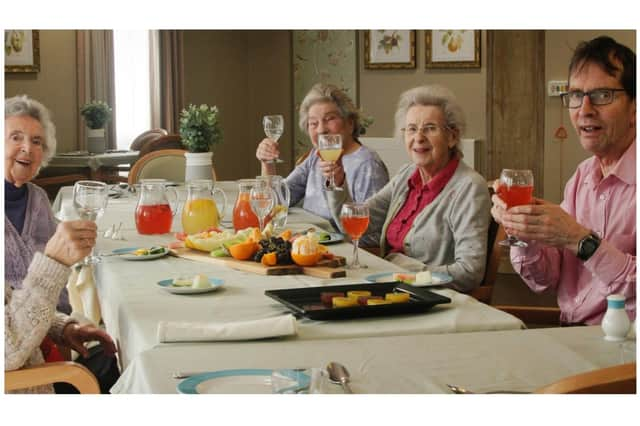Banbury care home offers advice to help support older people in the community


The guide covers every aspect of healthy eating, from why older people are more likely to see a decline in appetite, to how to create meals for people who may have lost the triggers that tell us we’re hungry.
The guide features nutritionally balanced meals and recipes that residents at Highmarket House enjoy on a regular basis, from lime and coriander fishcakes, beef stew and dumplings to parsnip and ginger cake.
Advertisement
Hide AdAdvertisement
Hide AdAs well as food, the guide also offers information on why people’s appetites change and shares advice for those living with dementia. Where possible, eating should be sociable, fun and stimulating.
Here are Highmarket House’s top tips for supporting older people to dine with dignity:
- The most important meal of the day – preserving independence is so important for someone living with dementia, and where better to start than at the breakfast table? Make sure all items are accessible, pour milk into small jugs and decant items such as butter, jam and marmalade into ramekins. This can help to encourage loved ones to serve food for themselves, if possible.
- Self-serve – Throughout the day, if they are able, give loved one’s control over mealtimes by letting them choose from options of what they would like to eat later, supporting them to safely pour their own gravy and custard from a jug, or to help themselves to their own vegetables from serving dishes.
Advertisement
Hide AdAdvertisement
Hide Ad- Time for tea – When making tea or coffee, assess whether someone is able to pour their own tea from the pot or cafetiere. For some, it might only be practical to add their own sugar, but anything that encourages independence is worthwhile.
- Make it social – Sit, eat and talk with loved ones as they dine. This will encourage them to stay seated for longer and to continue to eat or snack.
- Keep it simple – Don’t overwhelm someone living with dementia with too much choice. Ask closed questions. For example, ‘would you prefer toast or porridge?’, rather than ‘what would you like for breakfast?’
Care UK’s head of hospitality, James Clear, who helped design the guide, said: “Each team member who works in our homes has a responsibility to ensure that the people who live there are well nourished. Every interaction helps, whether it's a maintenance worker sitting down with a resident for a mid-morning tea or a carer suggesting someone eats a piece of fruit as a snack. With all that in mind, we wanted to ensure our expertise could be shared to help those in the community caring for older loved ones, and I believe this guide achieves exactly that.”
Advertisement
Hide AdAdvertisement
Hide AdFrancesca Cowley, home manager at Highmarket House, added: “Nutrition is incredibly important for overall health and wellbeing, especially for older people, so we’re pleased to share our tips and advice for keeping nourished throughout National Nutrition Month and beyond.
“It can be tricky for those caring for a loved one to ensure they eat plenty of nutritious meals and snacks, but our guide is packed with recipes and practical tips to help, including keeping as simple as possible, with fewer choices mealtimes, and having a chat over a cuppa or dinner to encourage loved ones to remain engaged and eat more.
“We’d like to encourage local people to download their own copy of the guide and to reach out to us if they need any further support.”
In addition to enjoying nutritious meals and snacks, Care UK home teams and residents across the country have been enjoying ‘getting physical’ for the new year, trying out new, fun forms of exercise to kick off the new year.
To download your free copy of the guide, click here: https://www.careuk.com/CareUK/media/Documents/Guides%20and%20booklets/CareUK-eating-as-we-age-guide.pdf